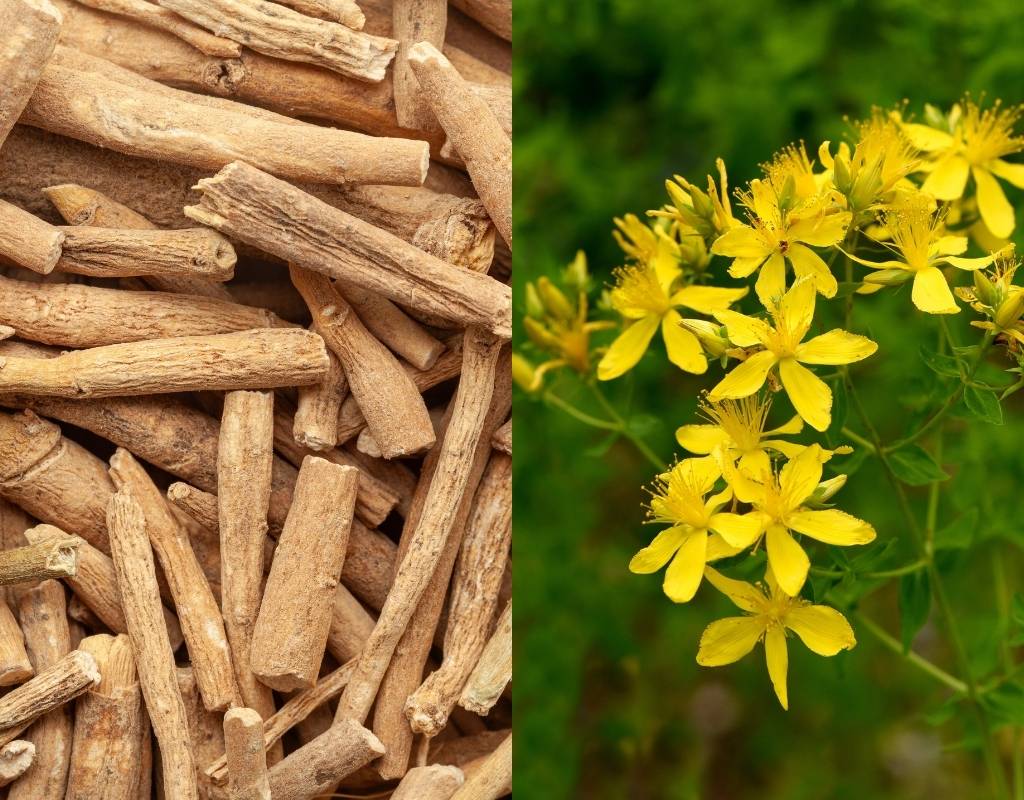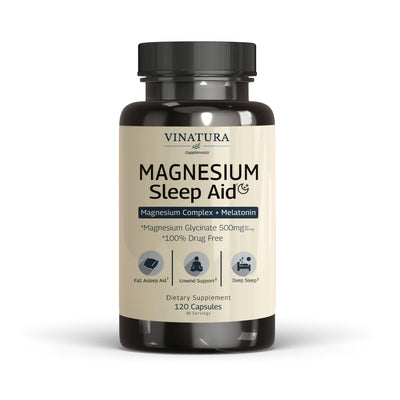
Ashwagandha vs St John’s Wort: Which Herb Is Best for Stress
Ashwagandha and St. John’s Wort are two popular herbal supplements often used for emotional wellness and stress support.
While Ashwagandha is known for promoting relaxation and balancing stress hormones, St. John’s Wort is commonly taken to support mood and emotional balance. This article compares their differences, benefits, safety considerations, and how to choose the right one for your wellness goals.
Before exploring further, please read the disclaimer located at the end of this webpage.
Key Takeaways
- Ashwagandha is primarily used to reduce stress and improve sleep quality and overall health.
- St. John's Wort is commonly taken to support mood in those experiencing occasional emotional discomfort and to promote emotional well-being.
- Combine Ashwagandha and St John's Wort with proper guidance, as it can cause serotonin syndrome.
Ashwagandha Vs John’s Wort: What’s Difference Between Them?
To better understand the differences between Ashwagandha and St John's Wort, refer to the following table:
|
Characteristics |
Ashwagandha |
St John's Wort |
|
Scientific Name |
Withania somnifera |
Hypericum perforatum |
|
Mechanism of Action |
Adaptogen, balances nervous system, reduces stress |
Increases serotonin, dopamine, norepinephrine levels |
|
Primary Use |
Stress reduction, nutritional supplement |
Natural melancholy treatment, psychological health care supplement |
|
Target Users |
Individuals needing stress reduction, immune support |
Individuals with mild to moderate melancholy symptoms |
Therefore, each herb has its unique advantages, suitable for different usage needs. If you are still unsure and don't know which product to use, consult a doctor for the most specific advice.
About Ashwagandha
What is Ashwagandha?

Ashwagandha, also known as Indian winter cherry and Withania somnifera, comes from the Sanskrit words "ashwa," meaning horse, and "gandha," meaning smell, describing the pungent odor of its fresh roots.
Ashwagandha is used in traditional Indian Ayurvedic medicine and is classified as a Rasayana (rejuvenating herb). Originally from India, it is also cultivated in Mediterranean regions, the Himalayas, Africa, the Canary Islands, the Cape of Good Hope, and Australia (Mikulska et al., 2023).
Ashwagandha has a rich chemical composition, with key active ingredients including withanolides and alkaloids.
Ashwagandha Benefits for Health
Historically, Ashwagandha has been used by healers to manage issues like sexual stimulation, pain relief (similar to modern anesthetics), overall health improvement, diuresis, deworming, and nervous system stimulation [1].
Recently, research has focused on its potential to manage stress, enhance memory, and improve physical strength. Some studies have shown promising results, highlighting its potential benefits, such as:
- Mental & Emotional Wellness: May support stress resistance, mood balance, better sleep, and cognitive function. Studies also suggest potential benefits for OCD and alcohol withdrawal symptoms [1,3,4,10].
- Brain & Nerve Support: Shows potential for neuroprotection in conditions like Alzheimer’s, Parkinson’s, and other neurological concerns; generally well-tolerated in studies [2].
- Hormonal & Reproductive Health: May help improve thyroid function, fertility in men and women, and support sexual wellness [6,7,11].
- Metabolic & Cardiovascular Health: May support blood sugar balance, heart function, circulation, and physical performance recovery [1,9,12].
- Immunity & Inflammation: May help modulate immune response and reduce inflammation linked to chronic health conditions [1,5].
Besides the benefits mentioned above, you can read more about whether Ashwagandha helps with hair loss.
Side Effects of Ashwagandha
Ashwagandha is generally well-tolerated, but some side effects, ranging from mild to severe, have been reported.
- Common side effects: stomach pain, nausea, drowsiness, and diarrhea [13].
- Rare but serious cases: liver issues, including cholestatic liver injury and jaundice [13].
- Reported incidents: one user recovered after stopping Ashwagandha; another required a liver transplant when combined with progesterone [13].
- Further research is needed to clarify Ashwagandha’s effects on liver health [13].
St John’s Wort Overview
St John’s Wort Origin

St John's Wort, also known as Hypericum or Millepertuis, has the scientific name Hypericum perforatum L. and belongs to the Hypericaceae family. The name Hypericum is believed to come from the Greek words "hyper" (meaning above) and "eikon" (meaning image).
St John's Wort is a perennial herb native to Europe and Asia, and it is now also cultivated and grows wild in the United States.
St. John's Wort contains many bioactive compounds, with hyperforin and Hypericin being the main active ingredients [14].
Benefits of John’s Wort for Health
Traditionally, St. John's Wort has been used to support the management of issues such as agitation, neuralgia, fibromyalgia, sciatica, menopausal anxiety disorders, depression, and nervous exhaustion. Additionally, it has been used to improve external wounds [14].
Below are the health benefits of St John's Wort:
- Mood, Stress & Sleep Support: May support mood balance, stress management, and sleep quality by modulating neurotransmitters like serotonin and dopamine. Some studies show effects comparable to antidepressants and benefits for OCD [14,15].
- Cognitive & Neurological Health: May support memory and reduce alcohol-related behaviors in animal studies. Effects on human memory remain unclear and may vary by dosage and extract type [14,19,20].
- Antibacterial & Antiviral Properties: Exhibits antibacterial activity against Gram-positive bacteria and antiviral effects against viruses like HSV and influenza. Antiviral activity may require light activation and has raised safety concerns in some studies [14,16,17].
- Anti-inflammatory & Digestive Support: Contains compounds that may help reduce inflammation and support gastrointestinal health, including potential anti-ulcer activity [14,18].
- Other Potential Effects: May offer antispasmodic activity and shows limited potential in cancer-related applications, though safety and drug interaction risks must be carefully considered [14,21].
Side Effects of John’s Wort

St. John’s Wort, like Ashwagandha, is generally well-tolerated, but it still poses some potential side effects for users.
- May cause digestive discomfort, dizziness, headaches, confusion, or fatigue in some users [14].
- Reported side effects occurred in 26.3% of users taking St. John’s Wort vs. 44.7% for traditional antidepressants [14].
- Rare cases of photosensitivity have been noted, especially at higher or experimental doses [14,17].
- Some individuals have experienced neurological effects like neuritis or mania, which resolved after stopping the herb [14].
Ashwagandha vs St. John’s Wort: Which Works Better?
Both herbs have been traditionally used for stress and mood support, but they work through different mechanisms and may suit different needs. The table below compares their potential benefits and safety profiles to help you decide which might be a better fit for your wellness goals:
|
Use Case |
Ashwagandha |
St. John’s Wort |
|
Stress |
May help support stress resilience, mood balance, and cognitive function, based on traditional use and some modern studies [1,3,4,10]. |
May help promote emotional balance and relaxation by affecting neurotransmitter activity (serotonin, dopamine) in some studies [14,15]. |
|
Mild Depression |
May support occasional low mood and emotional wellness, though not FDA-approved for depression; clinical evidence is less conclusive [1,3,10]. |
Traditionally used for mood support; some studies suggest benefit for occasional low mood, but consult a healthcare provider before use [14,15]. |
|
Sleep |
May help support sleep quality indirectly through its calming and adaptogenic properties [1,3,4]. |
May support restful sleep by promoting calm and emotional balance [14,15]. |
|
Safety |
Generally well-tolerated. Mild side effects may include digestive discomfort, drowsiness, or nausea. Rare cases of liver-related issues have occurred [13]. |
Generally well-tolerated. Some users report dizziness, fatigue, or light sensitivity. Rare cases of neurological effects resolved after discontinuation [14]. |
|
Best for |
Those seeking support for stress resilience, hormonal balance, or cognitive clarity. |
Those looking for natural support for mood and emotional wellness. |
Although many studies highlight the potential of Ashwagandha and St. John’s Wort, real user experiences on Reddit are mixed. Some consider them placebos and suggest seeing a doctor rather than relying on herbal remedies.*
Others report noticeable improvements or at least minimal side effects. Everyone has their own choice, but it’s important to remember that herbs can only offer support, they are not a substitute for prescribed treatment. If your condition worsens, don’t hesitate to seek professional help.*
Should I take ashwagandha and St. John's Wort together?

Currently, dietary supplements combine both Ashwagandha and St John's Wort to improve mental health, reduce stress and enhance emotional state. These products are thoroughly and scientifically researched to ensure safety.
However, you should not self-administer Ashwagandha and St John's Wort together. One reason is the lack of sufficient scientific evidence to determine whether using Ashwagandha and St John's Wort together is safe and effective.
Another reason is that both herbs affect serotonin levels in the brain. Combining them can lead to excessive serotonin, posing a risk of serotonin syndrome, a dangerous condition with symptoms like restlessness, agitation, tremors, and fever. Some individuals have reported experiencing serotonin syndrome when using both herbs together.
Besides St. John’s Wort, you may also be curious about combinations like Ashwagandha vs. Berberine, Holy Basil vs. Ashwagandha, or Blue Vervain vs. Ashwagandha. But remember to always consult a healthcare professional before combining herbs to ensure safety.
Things Need to Be Aware When Taking Ashwagandha and John’s Wort Together?
Although Ashwagandha and St John's Wort can complement each other in some cases, it is important to remember not to use them together without guidance, as it may lead to undesirable health effects. If you wish to combine these two herbs, you need a professional diagnosis from a doctor to have an appropriate treatment plan.
You can also use dietary supplements that combine both herbs. These products are rigorously inspected from production to safety verification.
Frequently Asked Questions
1. Why don't doctors prescribe St. John's Wort?
St. John’s Wort can interact with various medications, making it potentially unsuitable for those who are currently taking prescription drugs.
2. Is ashwagandha the best herb for anxiety?
Overall, research shows that ashwagandha helped lower stress and anxiety (based on validated self-report scales), improved sleep and reduced fatigue, and led to a decrease in cortisol levels—a key stress hormone—compared to placebo [22].
3. Are there negative side effects to ashwagandha?
Ashwagandha may cause side effects like drowsiness, digestive discomfort, diarrhea, or vomiting in some people. Although uncommon, a few cases have reported liver-related issues linked to its use. It is not recommended during pregnancy or while breastfeeding [23].
4. Does St. John's Wort make you happier?
St. John’s Wort may help improve mood by influencing brain chemicals like serotonin, dopamine, and others that play a role in emotional balance. While it doesn’t directly “make you happy,” it may support a more stable and uplifted mood in people experiencing occasional low mood.
Conclusion
Comparing Ashwagandha vs St John's Wort to determine which is "better" is not appropriate, as these herbs have different characteristics and uses that are suitable for the individual health needs of each person.
Additionally, while combining Ashwagandha and St John's Wort is possible, you should not do so without a doctor's supervision, as it may cause increased serotonin symptoms.
Testimonial Disclaimer
*The testimonials presented on this website are provided by individuals based on their personal experiences with our products. These testimonials represent individual opinions and experiences, which may not be typical or applicable to all users of our products. Results may vary depending on a variety of factors, including individual health, lifestyle, and adherence to product usage instructions.References
- [1] Mikulska P, Malinowska M, Miłosz Ignacyk, et al. Ashwagandha (Withania somnifera)—Current Research on the Health-Promoting Activities: A Narrative Review. Pharmaceutics. 2023;15(4):1057-1057. doi:https://doi.org/10.3390/pharmaceutics15041057
- [2] Sultan Zahiruddin, et al. “Ashwagandha in Brain Disorders: A Review of Recent Developments.” Journal of Ethnopharmacology. 2020;257:112876–112876. https://doi.org/10.1016/j.jep.2020.112876
- [3] Jahanbakhsh SP, Manteghi AA, Emami SA, et al. Evaluation of the efficacy of Withania somnifera (Ashwagandha) root extract in patients with obsessive-compulsive disorder: A randomized double-blind placebo-controlled trial. Complement Ther Med. 2016;27:25-29. doi:https://doi.org/10.1016/j.ctim.2016.03.018
- [4] Ruby B, Benson M, Kumar E, et al. Evaluation of Ashwagandha in alcohol withdrawal syndrome. Asian Pac J Trop Dis. 2012;2:S856-S860. doi:https://doi.org/10.1016/s2222-1808(12)60279-5
- [5] Chattopadhyay S, Cone RE. Role of Ashwangandha (Withania Somnifera) in Immune Modulation: Proposed Influence in Immune-Regulation. Digital Commons @ UConn. Published 2024. https://digitalcommons.lib.uconn.edu/som_articles/20/
- [6] Sengupta P, Agarwal A, Pogrebetskaya M, et al. Role of Withania somnifera (Ashwagandha) in the management of male infertility. Reprod Biomed Online. 2018;36(3):311-326. doi:https://doi.org/10.1016/j.rbmo.2017.11.007
- [7] Dongre S, Langade D, Bhattacharyya S. Efficacy and Safety of Ashwagandha (Withania somnifera) Root Extract in Improving Sexual Function in Women: A Pilot Study. Biomed Res Int. 2015;2015:1-9. doi:https://doi.org/10.1155/2015/284154
- [8] Widodo N, Kaur K, Shrestha BG, et al. Selective Killing of Cancer Cells by Leaf Extract of Ashwagandha. Clin Cancer Res. 2007;13(7):2298-2306. doi:https://doi.org/10.1158/1078-0432.ccr-06-0948
- [9] Nayak S, Panda BK, Das S. A Clinical Study on Management of Stress in Type-2 Diabetes Mellitus (Madhumeha) With Ashwagandha (Withania Somnifera). AYUSHDHARA. Published 2015. https://ayushdhara.in/index.php/ayushdhara/article/view/87
- [10] Cheah KL, Norhayati MN, Yaacob LH, Rahman RA. Effect of Ashwagandha (Withania somnifera) extract on sleep: A systematic review and meta-analysis. PLoS One. 2021;16(9):e0257843. doi:https://doi.org/10.1371/journal.pone.0257843
- [11] Efficacy and Safety of Ashwagandha Root Extract in Subclinical Hypothyroid Patients. J Altern Complement Med. Published 2021. https://www.liebertpub.com/doi/abs/10.1089/acm.2017.0183
- [12] Wankhede S, Langade D, Joshi K, et al. Effect of Withania somnifera supplementation on muscle strength and recovery: a randomized controlled trial. J Int Soc Sports Nutr. 2015;12(1). doi:https://doi.org/10.1186/s12970-015-0104-9
- [13] Office of Dietary Supplements - Ashwagandha: Is it helpful for stress, anxiety, or sleep? NIH.gov. Published 2021. https://ods.od.nih.gov/factsheets/Ashwagandha-HealthProfessional/
- [14] Barnes J, Anderson LA, Phillipson JD. St John’s wort (Hypericum perforatum L.): a review of its chemistry, pharmacology and clinical properties. J Pharm Pharmacol. 2001;53(5):583-600. doi:https://doi.org/10.1211/0022357011775910
- [15] Linde K, Ramirez G, Mulrow CD, et al. St John’s wort for depression--an overview and meta-analysis. BMJ. 1996;313(7052):253-258. doi:https://doi.org/10.1136/bmj.313.7052.25
- [16] Avato P, Raffo F, Guglielmi G, et al. Extracts from St John’s wort and their antimicrobial activity. Phytother Res. 2004;18(3):230-232. doi:https://doi.org/10.1002/ptr.1430
- [17] Pharmacokinetics, Safety, and Antiviral Effects of Hypericin in Patients with Hepatitis C. Antimicrob Agents Chemother. Published 2024. https://journals.asm.org/doi/full/10.1128/aac.45.2.517-524.2001
- [18] Koeberle A, Rossi A, Bauer J, et al. Hyperforin from St. John’s Wort suppresses Prostaglandin E2. Front Pharmacol. 2011;2. doi:https://doi.org/10.3389/fphar.2011.00007
- [19] An investigation into the acute nootropic effects... Behav Pharmacol. Published 2024. https://journals.lww.com/behaviouralpharm/abstract/2001/05000/an_investigation_into_the_acute_nootropic_effects.3.aspx
- [20] Ibid. (Duplicate of ref. 19)
- [21] Trofimiuk E, Holownia A, Braszko JJ. Activation of CREB by St. John’s wort and spatial memory. Arch Pharm Res. 2010;33(3):469-477. doi:https://doi.org/10.1007/s12272-010-0318-y
- [22] Office of Dietary Supplements - Ashwagandha. NIH.gov. Published 2025. https://ods.od.nih.gov/factsheets/Ashwagandha-HealthProfessional/
- [23] Ashwagandha: Usefulness and Safety. NCCIH. Published 2019. https://www.nccih.nih.gov/health/ashwagandha
Author

Product Disclaimer
The dietary supplement products mentioned on this website are formulated based on scientific research and adhere to FDA guidelines for dietary supplements. However, the content of the articles has not been evaluated by the Food and Drug Administration (FDA) and is not intended to promote or endorse any specific product. Any products sold on this website are not intended to diagnose, treat, cure, or prevent any disease.
Opinions and Endorsements
Any claims, statements, or opinions expressed in the articles are those of the author(s) and do not necessarily reflect the views or opinions of the manufacturers of the dietary supplement products. The products sold on this website are separate from the content of the articles and are not directly endorsed or associated with the information presented here.
Liability Disclaimer
The author(s) of the articles, website, and manufacturers of the dietary supplement products do not assume any liability for any potential consequences arising from the use of the information provided in the articles. It is recommended that individuals consult with a qualified healthcare professional before making any dietary or lifestyle changes, including the use of dietary supplements.
Product Usage
Please refer to the product labels and packaging for specific usage instructions and guidelines for the dietary supplement products sold on this website.
Customer Support
For any concerns or questions regarding the dietary supplement products, please contact our customer support team, who will be more than happy to assist you.





Leave a Comment
Be the first to comment.
What do you think?